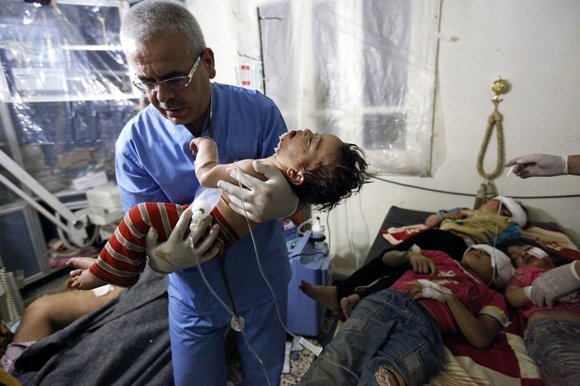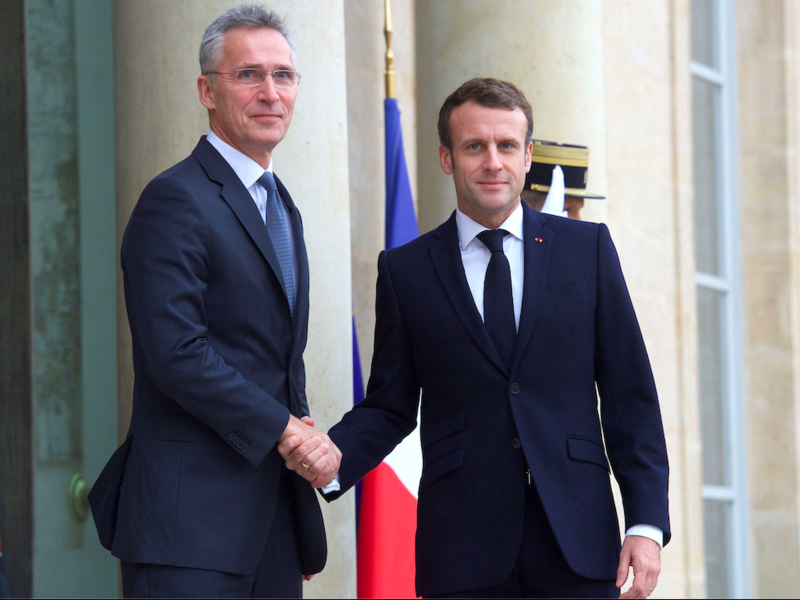[captionpix align=”center” theme=”elegant” width=”600″ imgsrc=”http://cdn.yenisafak.net/site/615×326/mideastsyria15a8dc2c1.jpg ” captiontext=”A scene of chaos and humanity. Doctors overwhelmed by casualties and fighting, treat those injured by shelling at Baba Amr Field Hospital near Jobar Syria.”]
In Syria, the spiraling conflict and worsening violence has seen for an increase in the depravity and desperateness of combatants. More and more it appears that innocent Syrians and the country’s critical infrastructure are becoming prime targets for both regime soldiers and rebel groups. One such causality of Syria’s deteriorating situation has been its medical system. Excessive shelling and fierce fighting has destroyed much of Syria’s medical infrastructure and cost the lives of countless medical professionals; while the draconian regime has handed down lengthy prison sentences, tortured, and even killed doctors suspected of practicing in rebel-held areas.
As a result, today Syria’s medical system sits on the verge of collapse, as millions of Syrians are unable to reach even basic medical care. Relief organizations working to alleviate the suffering are additionally facing growing obstacles in their missions to provide medical aid, and inadequate funding coupled with increasing violence means the situation isn’t expected to improve.
In January 2013, Syrian and UN health officials reported that the fighting in Syria had damaged over 50% of Syria’s hospitals, while one third of all medical facilities are either destroyed or shutdown. There is a major lack in medical supplies. Before the uprising, Syria produced 90% of its own medical supplies, however, as the majority of Syria’s medical production facilities lie in ruins, many regions are facing massive shortages. Medical relief organizations and the larger international community have made countless offers of relief, but as the Assad regime continues to move to isolate rebel held areas from outside support, much of the medical relief is unable to reach those truly in need.
[captionpix align=”left” theme=”elegant” width=”350″ imgsrc=”http://cs405224.vk.me/v405224089/7de5/RiMLeSkinRU.jpg” captiontext=”Dar al Shiffa hospital in Aleppo, Syria lies in ruins after a government airstrike struck the hospital in November 2012. Innocent doctors, nurses, and patients perished in the brutal attack. Syria’s hospitals are being targeted by armed groups more and more as the violence and depravity worsen.”]
In November 2012, a government airstrike destroyed Dar al Shifaa hospital in rebel-controlled Aleppo. The bomb struck the hospital in the middle of the day and among the casualties were doctors, nurses, and those seeking treatment, including women and children. Medicins Sans Frontières (MSF), one of the most outspoken critics of the Syrian government’s attacks on medical targets, has also widely reported that doctors believed to be providing medical care to the rebels have been deemed “enemies of the regime”, which can mean arrest, torture, and even execution. Rumors that government soldiers claim the life of one pro-rebel doctor is worth the lives of 100 rebel soldiers is a sentiment that typifies both the depravity of the conflict, and the true value of doctors today in Syria.
With medical facilities being bombed and doctors being hunted down, much of Syria’s medical system has gone underground. Field style medical centers have been set up in basements, farms, underground bunkers and even caves to try and support the countless number of Syrians casualties. These medical centers are extremely undersupplied, understaffed, and not in any way able to properly treat the injured. Doctors and surgeons are being forced to complete incredibly complex surgeries with only local anesthetic, while dentists, veterinarians and pharmacists have started providing medical care in areas where doctors are unavailable.
In early March 2013, MSF released a report that claimed Syria’s healthcare system was in dire need of more international support, as the majority of its medical facilities damaged or destroyed and more and more Syrian’s are being denied proper medical care. There must be further effort to deliver essential medical supplies and doctors into rebel held areas. Global Research recently reported that regardless of the future of fighting, Syria’s medical system will need considerable support if it hopes to recover from three years of conflict. The likelihood of outbreaks of water and food-borne diseases, vaccine preventable diseases, psychological trauma and a deterioration in the health of vulnerable groups is very high, and international medical organizations will play a critical role mitigating these issues – but only if adequate funding is provided.
Moving Forward – An Increase in Funding is Essential
Today, Syria is in a precarious situation that is worsening by the day. As this three part series has clearly illustrated, the hardship and violence facing Syria and her neighbors today has the real potential of spiraling out of control. With a refugee population expected to triple by years end, Syrian children facing widespread violence, and a medical system that is teetering on collapse, the need for an increase in relief and aid efforts has reached a critical point. As diplomats and other international players remained deadlocked in failing peace talks, while millions perish and suffer from the extreme violence, international relief and aid organizations are playing the sole role of alleviating the suffering – yet, remain incredibly underfunded. The UN Action Plan for Syria, which in January 2013 made a plea for $1.5 billion in funding to support aid efforts, continues to struggle to receive even a minority of the funds called for. As a result, countless programs working on the ground in and around Syria are being forced to shut-down operations.
What is needed is an international response, not simply from governments and international organizations, but from private citizens as well. Everyone must take a stand for the people of Syria, and help in funding essential relief efforts. The repercussion of a collapse in relief and aid operations could be catastrophic, but if the adequate funding can be found and the work of relief organizations expanded to accommodate the growing crisis, the lives of millions of Syrians could improve forever.




